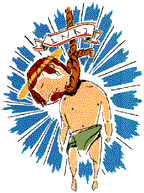
Image: Ward Schumaker
Plus:All-Time Best Tellers: There’s No Last Word on the Good Book.
In the beginning…
Nobody is sure why some books made it into the Bible and others didn’t, although there are records of both rabbis and church fathers arguing about what to include. Today, the Bible consists of the Hebrew Bible—what Jews call the Tanakh and Christians call the Old Testament—a compilation of stories, histories, and prayers ranging from around 1000 B.C. to the second century B.C. The Catholic Church also includes additions to the Old Testament called the Apocrypha. All Christians use the New Testament, which, composed in Greek from about A.D. 40 to 160, contains four accounts (the Gospels) of the life and message of Jesus Christ, as well as letters to Christian communities around the Mediterranean.
Latitude With Platitudes
Black Bible Chronicles is an attempt by P.K. McCary to “put the most important message of life into the language of the streets”; the Book of Genesis, for example, includes subchapters such as “World Up!,” “Cain Wastes Abel,” and “Noah Spells Relief.”
African American Family Press, 1993.
The Cotton Patch Version is Clarence Jordan’s daring late-’60s translation of portions of the Bible with a Southern twist: Jesus is born in Gainesville, Ga.; he is baptized in the Chattahoochee River; and the word “crucifixion” is replaced with “lynching.” Well-known proverbs also have a distinctly Southern tone. “Again I tell you, it is easier for a camel to go through the eye of a needle, than for a rich man to enter the kingdom of God” (Matthew 19:24) now reads: “I say it again, a pig can go through a knothole easier than a rich man can get in the God Movement.” Association Press, 1968-1973.
The Word Made Fresh, a paraphrased version of the Bible by nonbiblical scholar Andrew Edington, is known for its “pungent” language and earthy flavor: “When Noah learned of this, he chewed out his younger son” (Genesis 9:24-26); “Esau came in famished and pooped out” (Genesis 25:29). John Knox Press, 1975.
Fighting Words
At least two Bible translations provoked populist reactions—and backlashes. In the 1300s, John Wycliffe, believing everyone should read and live by the Bible, created a new English translation. Wycliffe was then blamed in part for a peasant revolt against the poll tax, during which the archbishop of Canterbury was beheaded. The church decided to outlaw unauthorized translations, executing Wycliffe’s adherents and digging up and burning his corpse for good measure.
William Tyndale’s 1535 English version was also wildly popular—and banned by the church. Tyndale was strangled and burned as a heretic.
Revered, If Not Holy
The best-selling nonfiction book of the 1970s was The Late Great Planet Earth, a fundamentalist apocalyptic interpretation of Ezekiel and Revelation by Hal Lindsey, who adapted premillennialist theories into ’70s lingo and predicted nuclear meltdown. By 1990, 28 million copies were in print. Sales soared again during the Gulf War. Zondervan Publishing House, 1970.
Believers in the three-volume, best-selling A Course in Miracles say it is the word of Jesus Christ, “channeled” through clinical psychologist Helen Schucman. From 1965 to 1972, she wrote down (in shorthand) the words of an inner voice she believed to be that of Jesus. More than 1.3 million copies have been sold. Foundation for Inner Peace, 1976.
 So Who Is Gideon Anyway?
So Who Is Gideon Anyway?
Since 1898, the Gideons International—an association of professional men in 172 countries—has given more than 450 million Bibles (King James Version) to hotels, motels, hospitals, schools, and penal institutions. And yes, if you’ve ever wondered, it’s yours for the taking.
Boardroom Inspiration
The Businessman’s Topical Bible, a compilation of biblical verses organized thematically for the office. Chapters include: “When You Face Constant Interruptions” (“Wherefore, my beloved brethren, let every man be swift to hear, slow to speak, slow to wrath,” James 1:19); “When You Are Asked to Participate in Unscrupulous Business Practices” (“Receive us: We have wronged no man, we have corrupted no man, we have defrauded no man,” 2 Corinthians 7:2); and “When People Think You Are Weird” (“For they loved the praise of men more than the praise of God,” John 12:43). Honor Books, 1988.















